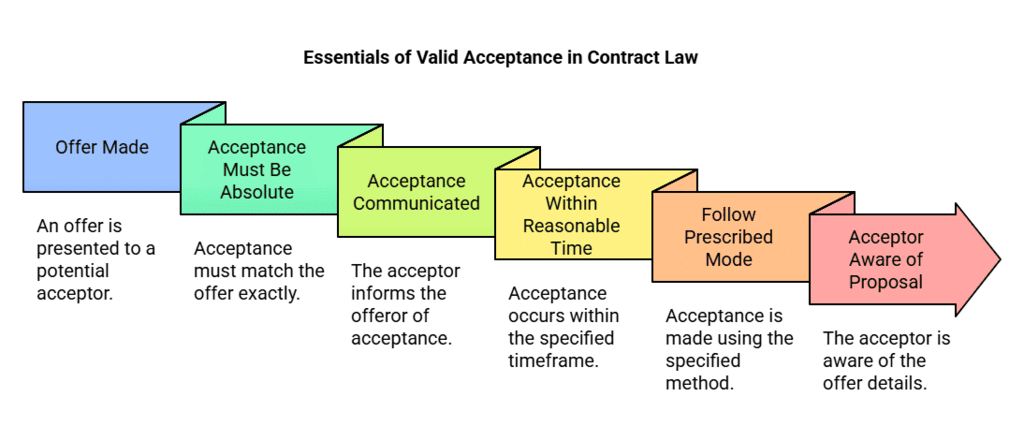Offer and Acceptance | Business Law - B Com PDF Download
| Table of contents |

|
| Meaning and Definition of Offer |

|
| Types of Offer |

|
| Essentials of a Valid Offer |

|
| Acceptance in Contract Law |

|
| Communication of Offer, Acceptance, and Revocation |

|
| Conclusion |

|
Meaning and Definition of Offer
- An offer is a crucial part of a valid contract. It represents a proposal from one party to another to enter into a legally binding agreement.
- According to the Indian Contract Act, an offer is called a "proposal." The person making the proposal is known as the "offeror" or "promisor," while the person receiving it is called the "offeree" or "proposee."

Key Elements of an Offer as per Section 2 (a)
- Willingness to Act: The offer must express a willingness to do something or refrain from doing something.
- Directed to Another Person: An offer cannot be made to oneself; it must be directed to another individual.
- Seeking Consent: The purpose of the offer is to obtain the consent of the other party to the proposed terms.
Types of Offer
Offers or proposals can be categorized based on:
1) How an offer is made
2) To whom an offer is made
1. How an Offer is Made: An offer may be either express or implied from the conduct of the parties.
a) Express Offer: An express offer is made through spoken or written words, such as letters, telegrams, telex, fax messages, emails, or internet communication. For example, when A offers to sell his dissection box to B for Rs. 400, it constitutes an express offer.
b) Implied Offer: An implied offer is inferred from the conduct of a party or the circumstances of a situation. Activities like stepping into a local bus, consuming food at a restaurant, or having shoes shined without explicit request create implied promises to pay for the services rendered.
2. To Whom an Offer is Made: : An offer may be made to —
a) a particular person or a particular group or body of persons,
b) the public at large i.e., the whole world.
a) Specific Offer: An offer directed to a specific individual or group is called a specific offer. Such offers can typically only be accepted by the designated person or persons.
b) General Offer:. General offer is addressed to the public at large, allowing anyone to accept it. For example, if A promises to pay Rs. 100 to B for returning his missing horse, it is a specific offer. However, if A publicly advertises a reward of Rs. 500 for anyone who finds his missing horse, it becomes a general offer, open to acceptance by any member of the public.
3. Positive and Negative Offers: A person may express their willingness to do something or to refrain from doing something. For instance, an offer to construct a wall for privacy or an offer not to build a wall to allow the free passage of light and air.
4. Cross Offers: Cross offers occur when two parties make identical offers to each other without knowledge of each other’s offer. These offers do not constitute acceptance of one party’s offer by the other.
Essentials of a Valid Offer
An offer is considered legally valid when it meets certain essential conditions. Let's explore these conditions in detail.
1. Offer must be Capable of Creating Legal Relations
- When making an offer, the offeror's intention should be to create a legal obligation.
- Offers that only create social or moral obligations are not valid.
- For example, inviting someone to a picnic or a cricket match does not create a legal contract.
- An invitation to lunch is a social matter and does not impose a legal duty.
- Therefore, an offer should be capable of resulting in a valid contract upon acceptance.
2. Offer must be Certain, Definite and not Vague
- The terms of the offer must be clear and precise.
- If the terms are vague or indefinite, a contract cannot be formed.
- Both parties should understand the legal implications of the contract.
- For instance, if someone offers to lease a building with vague conditions, it does not constitute a valid offer.
3. Offer must be communicated to the Offeree
- An offer is not complete until it is communicated to the intended recipient.
- The offeree must be aware of the offer to accept it.
- For example, if someone offers a reward for a lost dog, the person finding the dog must be aware of the offer to claim the reward.
4. Offer must be made with a view to obtaining the assent
- An offer should be made with the intention of obtaining the other party's agreement.
- It is not merely a statement of intention.
5. Offer should not contain a term the non-compliance of which may be assumed to amount to acceptance
- An offer cannot assume acceptance based on non-response.
- For example, if someone offers to sell a horse and assumes acceptance if there is no reply, it is not a valid contract.
- However, if the offeree is already in possession of the horse and continues to use it, silence may imply acceptance.
6. An Offer may be Conditional
- An offer can be subject to specific conditions.
- In such cases, acceptance is contingent upon meeting those conditions.
- For instance, a conditional offer to pay a certain amount to a trade union lapses if the condition is not accepted.
- However, courts may invalidate conditional offers if the terms are unreasonable or the offeree is unaware of the conditions.
7. Lapse of an Offer
An offer lapses under various circumstances:
a) If either the offeror or offeree dies before acceptance.
b) If the offer is not accepted within a specified time or a reasonable time if no time is specified.
c) If the offeree does not make a valid acceptance, such as a counter offer or conditional acceptance, or if a specific manner of acceptance is requested and not followed.
d) An offer can also lapse by revocation, where the offeror withdraws the offer before acceptance.
e) Offers may be made for a fixed period, expiring if not accepted within that time.
f) In the absence of a specified time limit, offers lapse after a reasonable time.
8. An invitation to offer is not an offer
a) An offer must be distinguished from an invitation to offer.
b)An invitation to offer is a preliminary step, inviting parties to make offers.
c)For example, a company advertising for bids is inviting offers, not making an offer itself.
9. Communication of Special Conditions
a) Definition: Special conditions in a contract refer to specific terms that may be unique or different from standard practices. These conditions need to be clearly stated and communicated to all parties involved in the contract.
b) Duty to Communicate: It is the responsibility of the person delivering the contract document to inform the offeree (the party receiving the offer) about the special terms and conditions included in the document. This communication is crucial because if the offeree is not made aware of these terms, they will not be bound by them.
c) Example: Consider a scenario where a transport company accepts goods from a sender (let's say A) for transportation without any specific conditions attached. Later, the company issues a circular to all consignors, stating that it limits its liability for goods that are damaged or lost during transit. If this circular is not communicated to the sender (G) before the contract is made, G will not be bound by the new condition.
d) Legal Implications: The legal principle here is that for special conditions to be enforceable, they must be brought to the attention of the concerned party before the contract is finalized. If not, the party may have grounds to challenge the validity of those conditions.
Acceptance in Contract Law
Acceptance is a crucial element for forming a valid agreement. It occurs when the offeree, the person to whom the offer is made, agrees to the terms of the offer. An offer transforms into a promise or an agreement only after it is accepted.
Legal Perspective
- According to Section 2 (b) of the Indian Contract Act, an offer is accepted when the offeree signifies their assent to it. An accepted proposal is referred to as a promise or an agreement.
Insight from Sir William Anson
- Sir William Anson likens acceptance to a lighted match igniting a train of gunpowder. Just as a match triggers a powerful explosion, acceptance transforms an offer into a binding agreement.

Parties Involved in Acceptance
- When an offer is directed to a specific individual, only that person can accept it. Acceptance by anyone else is not valid.
- In the case of a general offer, however, anyone can accept the offer.
Essentials of a Valid Acceptance

1. Acceptance Must Be Absolute and Unconditional
- Acceptance must be absolute and unconditional, matching the offer exactly.
- If acceptance is absolute, it creates a binding contract.
- A qualified acceptance is not valid; it constitutes a counter-offer.
- For example, if A offers to sell land for Rs. 5,00,000 and B accepts but adds payment conditions, it is not a valid contract.
2. Acceptance Must Be Communicated to the Offeror
- Acceptance is only valid when communicated to the offeror.
- A mere intention to accept without communication is insufficient, as established in legal cases.
3. Acceptance Must Be Made Within a Reasonable Time
- Acceptance should be within the time specified by the offeror or within a reasonable timeframe.
- What constitutes a reasonable time depends on the specific circumstances.
- Acceptance after withdrawal of the offer is invalid.
4. Acceptance Must Follow the Prescribed or Usual Mode
- Acceptance should be made in the manner prescribed by the offeror.
- If no specific mode is prescribed, acceptance should be in a usual and reasonable manner, such as by mail.
5. The Acceptor Must Be Aware of the Proposal
- Acceptance requires knowledge of the offer.
- If the acceptor is unaware of the offer and accepts, no contract is formed.
6. Acceptance Must Occur Before the Offer Lapses or is Revoked
- Acceptance must be within the period the offer is valid, before revocation or lapse.
- For example, a prospective resignation can be withdrawn before acceptance by the authority.
7. Acceptance Cannot Be Implied from Silence
- Silence or inaction does not imply acceptance unless indicated by previous conduct.
- For instance, if Rakesh offers his car to Shyam and sets a deadline for response, Shyam's silence does not constitute acceptance.
Communication of Offer, Acceptance, and Revocation
For a contract to be valid, there must be a clear offer and acceptance. When parties are present together, an agreement is formed as soon as the offeree accepts the offer without any conditions. However, issues arise when parties are at a distance and need to communicate their intentions.
According to Section 3 of the Indian Contract Act, communicating an offer, acceptance, or revocation involves an action or omission by the party involved, which must effectively convey the intended message.
A. Communication of an Offer (Section 4)
An offer is considered communicated when it reaches the knowledge of the person it is intended for. For instance, if P offers to sell a house to S through a letter, the offer is communicated when S receives the letter.
B. Communication of Acceptance (Section 4)
The communication of acceptance is deemed complete:
a) Against the proposer: When the acceptance is dispatched, making it impossible for the acceptor to withdraw it.
b) Against the acceptor: When the acceptance comes to the knowledge of the proposer.
For example, if A offers to sell a house to B, and B accepts the offer by posting a letter, the acceptance is complete as against A when the letter is posted and as against B when the letter is received by A. This means that the proposer is bound by the acceptance as soon as the letter is posted, while the acceptor is not bound until the letter is received. In other words, the acceptor has the right to revoke their acceptance before it is received by the proposer.
C. Communication of Revocation of Proposal (Section 5)
Revocation means withdrawing or taking back an offer or acceptance. The communication of revocation is considered complete in the following cases:
i) As against the person revoking:. proposal can be revoked at any time before the acceptance is communicated to the proposer, but not after.
ii) As against the person to whom it is made: Revocation is complete when it comes to the knowledge of the person to whom it is made.
An offer can be revoked before acceptance, and acceptance can be revoked before its communication. Therefore, the revocation of acceptance must reach the offeror before the acceptance is communicated.
Modes of Revocation of an Offer (Section 6)
A proposal can be revoked in various ways as per Section 6 of the Act.
1. By Notice
- A proposer can revoke their proposal before it is accepted by sending a clear and unambiguous notice of revocation.
- This notice can be communicated through various means such as word of mouth, letter, telegram, telephone, or even through behavior and action.
- The notice should be communicated by the person who made the offer or their authorized representative.
2. By Lapse of Time
- A proposal comes to an end by the lapse of time prescribed in the proposal for its acceptance or by the lapse of a reasonable time if no time is prescribed.
- A reasonable time for acceptance can vary depending on the circumstances of each case, such as the nature of the subject matter of the contract.
3. By Non-fulfilment of an Essential Precedent
- If the offeror has set a condition precedent for the acceptance of the offer, such condition must be met for a valid acceptance of the proposal.
- Non-fulfilment of an essential pre-condition nullifies the proposal and its acceptance.
4. By Death or Insanity of the Proposer
- A proposal is revoked by the death or insanity of the proposer if the acceptor becomes aware of the death or insanity before acceptance.
- If the offer is accepted without knowledge of the death or insanity of the offeror, the acceptance is valid.
5. By Counter Offer
- An offer comes to an end when the offeree makes a counter offer or rejects the offer.
- A qualified acceptance, where the offer is accepted with modifications or conditions not present in the original offer, amounts to a counter offer.
6. By non-acceptance according to prescribed mode
- An offer is revoked if it is not accepted according to the prescribed or usual mode.
- According to Section 7, it is the duty of the offeror to inform the offeree if the acceptance does not meet the prescribed conditions.
- If the offeror fails to do so, they are deemed to have accepted the acceptance.
7. By subsequent Illegality
- An offer lapses if it becomes illegal after it is made and before it is accepted.
- If a change in law makes the contract contemplated by the offer illegal or incapable of performance, the offer comes to an end.
Conclusion
Understanding the meaning, types, and essentials of an offer is fundamental in contract law. Offers form the basis of agreements, and clarity in communication regarding offers and acceptances is critical for enforceability in legal contexts.
|
30 videos|99 docs|17 tests
|
FAQs on Offer and Acceptance - Business Law - B Com
| 1. What is Offer and Acceptance in B Com? |  |
| 2. What are the requirements for a valid offer in B Com? |  |
| 3. Can an offer be revoked in B Com? |  |
| 4. What constitutes acceptance of an offer in B Com? |  |
| 5. What are the consequences of a breach of contract in B Com? |  |
















